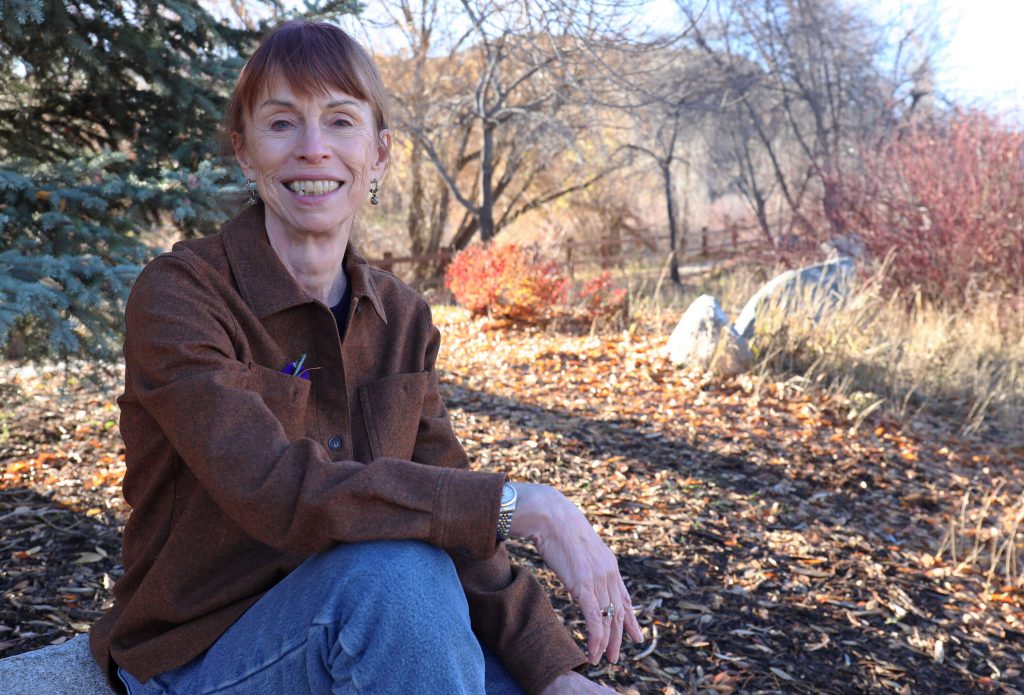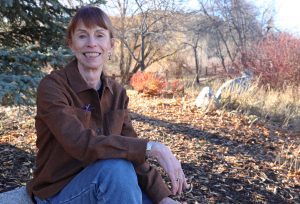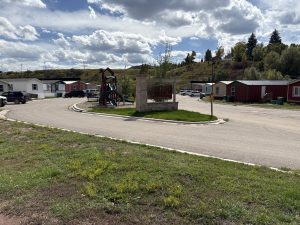Housing crisis tops West’s platform in competitive at-large City Council race

John F. Russell/Steamboat Pilot & Today
Councilor Joella West, current incumbent of the District 2 seat on the Steamboat Springs City Council, is facing a competitive race this November for the two-year at-large seat.
In July, West and Councilor Steve Muntean, the current at-large representative, announced they would each be running for the other’s seat. While Muntean is running unopposed, West, whose campaign slogan is “Experience Matters,” is running against six other candidates.
Three of those candidates have ended their campaigns to endorse Dave Barnes, but their names will remain on the ballot.
West began coming to Steamboat in 2001 when her son moved to the Yampa Valley. She and her husband Larry bought a North Routt County ranch in 2006, splitting their time between the ranch and Los Angeles while volunteering as firefighters and EMTs for the North Routt Fire Protection District.
The couple made Steamboat their full-time home in 2015 and hope to continue being active members of the community for years to come.
When asked during an interview with the Steamboat Pilot & Today about her reaction to the whopping number of candidates running for the at-large seat, West simply responded: “Surprise.”
She said that “a lot of jokes have been made” about whether she regrets her decision to do a district swap given the unexpectedly long list of competitors. But she clarified that she stands firmly behind her decision “for a couple of reasons.”
“My observation of council over the years, both inside and sitting outside, is that this is such a hard job … eight years is too long,” she said of her decision to not seek another four-year term in District 2. “I appreciate and respect the people who have done that, and honestly, I don’t know how they do that … I saw burnout, and I thought very seriously about that.”
“The second (reason), frankly, is age. I hope the whole country learned the lesson from (former U.S. Supreme Court Justice) Ruth Bader Ginsburg — ‘I can go on, I can go on, I can go on,’ and when she couldn’t go on anymore, she left a mess. I would never want to be in that position.”
As reported by the newspaper in July, housing stands as the dominant issue on West’s platform. She noted the most recent developments with the Brown Ranch Community Solutions Project — specifically, the 40-member Deliberation and Stewardship Team, which council directed last week to proceed to Phase 2 — and the need for continued community involvement, despite the slow pace of the process.
“We are now in this position where we can say, ‘OK, there might be a future to Brown Ranch. We don’t know what it would look like. But this group of 40 people spent a lot of their time and brain cells talking about, would this work? Could it work, in any form?” she said. “And they came back and said, ‘It could.'”
“We only had one person who said, ‘No, this shouldn’t go forward.’ Out of 40 people, that’s a really good indication that we need to pursue that path,” she added.
West emphasized the need for continued conversations about what the city can do in the meantime “to provide short-term, medium-term housing,” as phase 2 of the DST will not be complete until March.
She expressed an openness to various methods of helping to alleviate the housing crisis for nurses, teachers, restaurant employees and other workers forced to commute from outlying communities — down-payment assistance, purchasing deed restrictions, assistance for first and last months’ rent, and/or buying units in new developments — but underscored that the city must take some form of action while awaiting results of the Brown Ranch process.
“We have to make decisions about how acceptable is it for what portion of our workforce to live out of town and have to commute, and that’s a battle between reality and economics and sustainability — and, frankly, safety,” she said, referring to the dangers of driving on U.S. Highway 40.
Regarding the leadership at the Yampa Valley Housing Authority, West did not wish to speak on specifics, but acknowledged that the city and housing authority “both have work to do to repair that relationship.”
“The original negotiations for Brown Ranch were exceptionally difficult, and it did not improve in any way the relationship between the city and the housing authority,” she said. “We have to have better communication.”
On the topic of relationships, West spoke bluntly on the current state of the relationship between the city and Steamboat Ski & Resort Corporation given Ski Corp.’s last-minute retreat last month of a long-touted 20-year, $1 million annual contribution to the proposed Yampa Valley Regional Transportation Authority.
“I think that labeling it a partnership is misleading. I am not sure what a partnership would look like,” she said, noting that both entities must “learn to live together.”
“I think (Ski Corp.) did incredible damage to that concept with their voluntary contribution to the RTA, and how that was … mishandled by them. And I think that has damaged their relationship, not just with the city, but with the residents and with the county,” she continued.
“How that gets repaired is up to them,” she added. “How that will be accomplished at this point, I really don’t know.”
As for budget concerns and the often contentious tax proposals made by council to rectify a declining stream of sales tax revenue, West said the city has taken proactive steps by bringing in a consultant team to review city operations and finances.
“So if we need to make changes, if we need to cut budget, if we need to cut staff, if we need to cut programs, that will all be on the table there, guided by the expert research and advice,” she added.
West spoke at length regarding a commonly raised concern that “Steamboat is losing its soul,” noting that it’s something she takes seriously — but that the statement could mean different things to different people.
“Number one, we can’t turn back the clock … so what do we do as we go forward? How do we identify that soul so that we can measure everything that we do against that statement?” she said. “We can’t shut the doors and say, ‘Everybody who’s here is fine, but no one may come here again.'”
“What is the period of significance that we’re trying to preserve here? Or is it broader than that?” she said, noting that the preservation of Steamboat’s character could take many forms — historic preservation, deeper investment in the arts community, and/or setting policy that signals respect to the generations of ranchers in the valley.
“What are the other ingredients? Is it the visuals? Is it preserving Main Street? Is it how many bike trails we have? Steamboat used to be Bike City USA. It’s been Dog City USA … maybe that’s not what people mean when they say ‘the soul of Steamboat.'”
As far as how West sees herself compared to her competitors for the at-large council seat, she made clear that she would not be running a negative campaign. But she said she brings not only experience in deal-making — both on council and her professional experience as a lawyer — but also the combination of “patience and persistence” necessary to be a strong, thoughtful city leader.
“I would say to anybody who is choosing who to vote for, keep in mind what a demanding job this is, what it asks of council members,” said West at the close of the interview. “Decide what you think success looks like for your council members, and make your decisions on that basis.”
To reach West or learn more about her campaign, email JWest@SteamboatSprings.net.

Support Local Journalism

Support Local Journalism
Readers around Steamboat and Routt County make the Steamboat Pilot & Today’s work possible. Your financial contribution supports our efforts to deliver quality, locally relevant journalism.
Now more than ever, your support is critical to help us keep our community informed about the evolving coronavirus pandemic and the impact it is having locally. Every contribution, however large or small, will make a difference.
Each donation will be used exclusively for the development and creation of increased news coverage.










